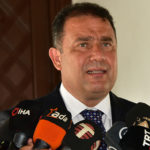No one has yet to take responsibility for the bombing near the Assad Bridge in Damascus on Wednesday, which killed 14 soldiers and injured scores of others. Bashar Assad shortly after sent Syrian Air Force jets to bomb the rebel-held city of Ariha in Idlib Province, killing at least eight people, children among them.
It is doubtful Damascus will be satisfied with their initial response. Idlib and Ariha have become the main arena of confrontation in Syria – and not just between the regime and the thousands of militia fighters based there.
Idlib is also a zone of conflict between Syria and Russia on the one side and Turkey on the other, threatening to drag them into a military confrontation.
In the last few years, Russia has worked hard to bring about local cease-fires across Syria between rebel forces and the Syrian army. As part of these deals, Syrian and Russian forces agreed to let militia fighters exit their hometowns and move to Idlib on condition they bring only their personal arms and leave behind heavy weapons as government forces take control of the towns and cities they have evacuated.- Advertisment –
On paper, these deals are negotiated agreements; in practice, Russia and the Syrian army gave the militants no real choice: They could either continue fighting against superior forces or surrender. The process continues to this day, with the Russian Coordination Force in Syria, which is responsible for reaching these local cease-fire agreements, recently bringing an end to violent clashes in southern Syria’s Daraa Province by reaching agreements with 16 cities and villages. The cease-fire pact will enable the Syrian army, accompanied by Russian military police and pro-regime militias, to enter and take control of the area.
Idlib, which has turned from a place of refuge for militia fighters into their last military redoubt, is controlled mainly by Hayat Tahrir al-Sham. The group was formed in 2017 after several radical Islamic militant groups joined together, the biggest and most important of them Jabhat al-Nusra, which used to be the arm of Al-Qaida in Syria. Tahrir al-Sham governs most of the province as a country within a country, with a lifeline provided by Turkey.
Under an agreement signed between Russia and Turkey three years ago, Turkey is supposed to disarm the militias in Idlib and expel the Tahrir al-Sham fighters from the province. But the agreement remains mostly on paper.
In February 2020, Russian fighter jets bombed Idlib, killing 50 Turkish soldiers. Tensions between Russia and Turkey peaked after Ankara accused Moscow of intentionally targeting its troops, and Russia responded by saying Turkish forces had no reason to be there to begin with and that Turkey hadn’t coordinated its presence with the Russians.- Advertisment –
In an effort to prevent an escalation, the two sides signed a new cease-fire agreement with terms similar to the one they signed in 2018. But this agreement also failed to bring about a disarming of the militants or the expulsion of Tahrir al-Sham fighters, whom Russia and Syria both deem as terrorists.
It appears that Turkey, despite the commitments it made to Russia, not only finds it very hard to impose its will on the militias but is in no hurry to do so. It sees control of Idlib as a bargaining chip it can use to win concessions from Moscow over other parts of Syria. Turkey argues that Russia hasn’t kept its end of the bargain to evacuate Kurdish forces from the border area between it and Syria, in particular from the cities of Manbij and Tell Rifaat. Thus, in response to Moscow’s demands to expel militants from Idlib, Ankara is demanding that the Russians move ahead with their part of the agreement and expel Kurdish fighters.
In recent days, tensions have flared up after a Turkish military convoy was attacked on October 10, apparently by Kurdish forces, during which two Turkish special forces soldiers were killed. Turkey has started to advance forces to the area and announced that it “will take measures to ensure the safety of its troops.” The warning has been interpreted to mean that Turkey intends to begin a war in the border region, occupy Kurdish towns and expel Kurdish fighters without waiting for the Russians. In response, Syrian forces, with Russian backing, have begun to advance toward Idlib, threatening a military campaign to wrest control of the rebel province.- Advertisment –
All this has taken place since a summit between the Turkish and Russian leaders on September 29 which apparently yielded no breakthrough on the question of Idlib. Turkey continues to stick to its demand that the Kurdish threat be removed from its border. Russia, which is hoping to enlist the Kurds in its efforts to reach a political settlement and end the crisis in Syria, has no interest in entering a conflict with them.
Under the circumstances, the fear arising from Wednesday’s bombing in Damascus and the Syrian attacks on Ariha is that they could cause the Syrian army and its Russian backers to start a real war over Idlib. In turn, potentially wrecking the Turkish-Russian agreement, deny Turkey the possibility of gaining control of Kurdish areas adding hundreds of thousands of refugees to the current 3.5 million already residing in Turkey.
However, Russia understands that developments like these could put it into conflict with Turkey at a time when it needs Ankara’s help as an ally against the United States. Turkey’s purchase of Russian S-400 anti-aircraft missile systems has created a deep rift between Ankara and Washington that began during the Trump administration and has grown wider under President Joe Biden. For Russia, the deal was not only good business but won it a new friend at America’s cost. To preserve their friendship, both Moscow and Ankara are not at all anxious to enter into a military conflict over Idlib.
At the same time, neither of them can completely control tactical developments, such as attacks staged by militants against the Syrian armed force or those by Kurds against Turkish troops. Incidents like these risk provoking a two-front military campaign, one in Idlib and the other in the Turkish border region, and creating a dangerous confrontation between Russia and Turkey.
By: Zvi Bar’el
Source: Haaretz



